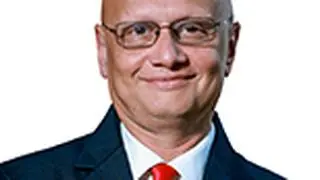The gap between the Congress and the BJP in the Upper House is set to narrow down considerably following the upcoming biennial elections to the Rajya Sabha for 57 seats.
The BJP’s overall tally of 49 seats is expected to increase by as many as five seats, going up to 54 MPs in the Upper House, with a majority of gains coming from Rajasthan, where the party had swept the Assembly polls in 2014.
The ruling party has accordingly shifted Parliamentary Affairs Minister M Venkaiah Naidu from Karnataka to Rajasthan this time. Other party nominees from Rajasthan are Om Mathur, Harsh Vardhan Singh and Ram Kumar Verma.
The BJP released its second list of nominees too on Monday, including Suresh Prabhu from Andhra Pradesh, MJ Akbar from Madhya Pradesh, Vinay Sahastrabhudhe and Vikas Mahatma from Maharashtra, Shiv Pratap Shukla from Uttar Pradesh and Mahesh Poddar from Jharkhand.
The Congress’s nominations this time are high-profile speakers including P Chidambaram, Kapil Sibal, Jairam Ramesh and Vivek Tankha.
Falling numbersThe party will maintain its lead albeit by a much narrower margin, suffering losses in Andhra Pradesh, Telangana as well as Rajasthan. From its current perch of 64 seats in the Upper House, the principal opposition party is expected to lose as many as six-seven seats. After these elections, the BJP’s strength is expected to hover somewhere around 54 seats while the Congress may come down to 57-58 seats.
Add to the BJP tally the vote of six MPs nominated this year and the party’s numbers swell up even further. Two of the nominated MPs — Subramanian Swamy and Navjot Singh Sidhu — are officially BJP members.
The ruling party is accordingly hopeful of pushing the GST Bill in the monsoon session. With the expected 54 MPs of its own, the BJP will add the support of MPs from TMC (12), BJD (7), PDP (2), SAD (3) and Shiv Sena (3). It is also likely to get support from the TDP, which expects to add one more seat to its existing six MPs in Parliament after this election, and the TRS which too expects to add one more seat to its existing lone seat in the Upper House. However, the BJP still has to contend with the Congress with its expected 57 seats, along with the JD(U) (13 seats); the RJD, which will also add one more seat to its existing one in the Rajya Sabha; and the SP, which has 15 seats and hopes to add at least four more in the upcoming elections. The NCP too is in the opposition camp with its six MPs.
Moreover, the AIADMK, with its 12 sitting MPs and an addition of one more seat in the upcoming round, is opposed to the GST. The BSP, which is set to lose heavily from its 10 seats, normally votes along with the Opposition.
Altogether, this does not look like a comfortable position for the passage of a Constitutional amendment that requires two-thirds support in Parliament.
According to Leader of Opposition in the Rajya Sabha Ghulam Nabi Azad, the BJP’s confidence about GST passage is not matched by the numbers.
“It would be difficult to isolate the Congress. Our allies in Bihar, the JD(U) and the RJD, do not support the GST. We also have an alliance in Tamil Nadu and even the AIADMK is opposed to the GST. Then there is the NCP and the Left who are even more opposed to the present form of this Bill,” Azad told BusinessLine in an interview last week.
Bihar debacleThe BJP would have more than made up for its shortfall if it had won in Bihar last year. Now, the five seats in Bihar will be largely shared by the principal players in the Mahagathnandhan — the JD(U) and the RJD.
From Bihar, Lalu Prasad’s daughter Misa Bharati, JD(U) leader Sharad Yadav and noted lawyer Ram Jethmalani filed their nominations for the Upper House on Monday.







Comments
Comments have to be in English, and in full sentences. They cannot be abusive or personal. Please abide by our community guidelines for posting your comments.
We have migrated to a new commenting platform. If you are already a registered user of TheHindu Businessline and logged in, you may continue to engage with our articles. If you do not have an account please register and login to post comments. Users can access their older comments by logging into their accounts on Vuukle.